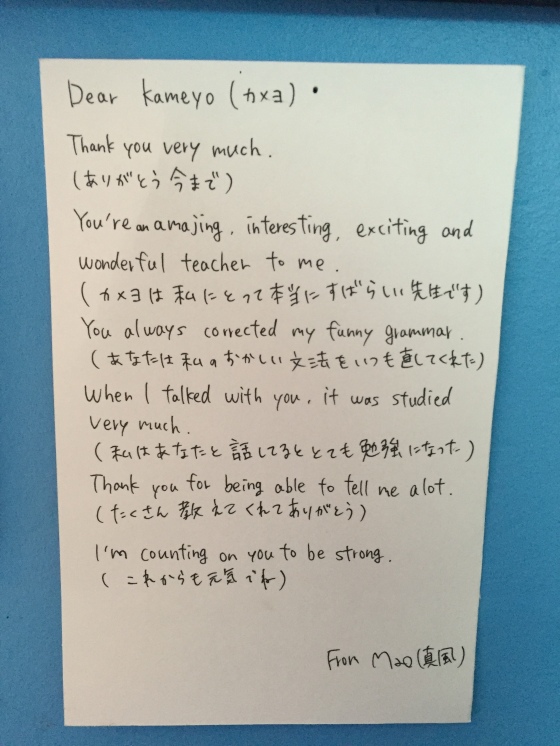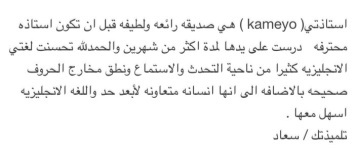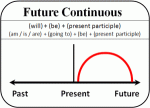A student reminded me of this poem by Gerard Nolst Trenité, called “The Chaos”, so I decided to transcribe it!
I chose to do fairly detailed transcriptions, instead of general ones, so that learners can get a more accurate idea of the pronunciation and become more familiar with the International Phonetic Alphabet (IPA). I have included a link, at the end of the poem, to an interactive IPA chart where you can click on the various symbols and hear the sounds they make! Keep in mind that this is an international chart, so it includes all the sounds of all the languages, not just English or your first language. This is a super fun and useful tool for studying languages.
- According to the IPA, the “ɹ” symbol represents the North American r sound in words such as right. The IPA “r” is a trilled r found in other languages, so there is actually a very big difference between the two symbols.
- The “ʔ” is not a question mark! Nope, it is a sound called a glottal stop, and you can make this sound by saying “uh-oh”.
- The “ɾ” is called a flap, and it’s the d sound that the t makes in words like better [bɛ.ɾəɹ]
- The period [.] in the transcriptions marks a syllable break
- The apostrophe [ˈ] marks syllable stress when there are two or more syllables. If the word is only one syllable, I don’t mark it.
- I should point out that there are different ways of transcribing, so you may be used to different symbols than I have used here. For example, “əɹ”, “ər” and “ɚ” are three different symbols used to represent the same sound.
Dearest creature [ˈkri.tʃər] in creation [kri.ˈeɪ.ʃən]
Study English pronunciation [pɹə.ˈnʌn.si.eɪ.ʃən]
I will teach you in my verse [vəɹs]
Sounds like corpse [kɔɹps], corps [kɔɹ], horse [hɔɹs], and worse [wǝɹs].
I will keep you Suzy [ˈsu.zi], busy [ˈbɪ.zi],
Make your head [hɛd] with heat [hit] grow dizzy [ˈdɪ.zi].
Tear [tiɹ] in eye, your dress will tear [teɪɹ]
So shall I [ai]! Oh hear [hiɹ] my prayer [pɹeɪɹ].
Just compare heart [hart], beard [biɹd], and heard [hərd],
Dies [daɪz] and diet [ˈdaɪ. ɛt], lord [lɔrd] and word [wəɹd],
Sword [sɔɹd]and sward [swaɹd], retain [ɹɛ.ˈtaɪn] and Britain [ˈbɹɪ.ʔ]
Mind the latter [ˈlæ.ɾəɹ], how it’s written [ˈɹɪ.ʔ]
Now I surely will not plague [plaɪg] you,
With such words as plaque [plæk] and ague [ˈaɪ.gu].
Be careful how you speak [spik]:
Say break [bɹeɪk] and steak [steɪk], but bleak [blik] and streak [stɹik]
Cloven [ˈklow.vɛn], oven [ˈʌ.vən], how [haʊ] and low [loʊ],
Script [skɹɪpt], receipt [ɹə.ˈsit], show [ʃoʊ], poem [ˈpoʊ.əm], and toe [toʊ].
Hear me say devoid of trickery [ˈtɹɪ.kəɹ.i],
Daughter [ˈdɑ.ɾəɹ], laughter[ˈlæf.təɹ], and Terpsichore [tɜrp.ˈsɪ.kəɹ.i].
Typhoid [ˈtaɪ.fɔɪd], measles [ˈmi.zəlz], topsails [ˈtɑp.seɪlz], and aisles [ˈaɪ.əlz],
Exiles[ɛk.ˈsaɪ.əlz], similes [ˈsɪ.mə.liz], and reviles [ɹɪˈvaɪ.əlz];
Scholar [ˈskɑ.ləɹ], vicar [ˈvɪ.kəɹ], and cigar [səˈɡɑɹ]
Solar [ˈsoʊ.ləɹ], mica [ˈmaɪ.kə], war [ˈwɔɹ], and far [faɹ];
One [wʌn], anemone [əˈnɛ.mə.ni], balmoral [bælˈmɔɹ.əl],
Kitchen [ˈkɪ.tʃən], lichen [ˈlaɪ.kən], laundry[ˈlan.dɹi], laurel [ˈlɔɹ.əl];
Gertrude [ˈgeɹ.tɹud], German [ˈdʒəɹ.mən], wind [wɪnd/waɪnd], mind [maɪnd],
Scene [sin], Melpomene [mɛlˈpɑ.mə.ni], mankind [mænˈkaɪnd].
Billet [ˈbɪl.ət] does not rhyme with ballet [bæ.ˈleɪ],
Bouquet [boʊ.ˈkeɪ], wallet [ˈwa.lɛt], mallet [ˈmæ.lɛt], chalet [ʃæˈleɪ].
Blood [blʌd] and flood [flʌd] are not like food [fud],
Nor is mould [moʊld] like should [ʃʊd] and would [wʊd].
Viscous [ˈvɪs.kəs], viscount [ˈvaɪ.kaʊnt] , load [loʊd] and broad [bɹɑd],
Toward [tə.ˈwɔɹd], forward [ˈfɔɹ.wəɹd], reward [ɹə.ˈwɔɹd]
And your pronunciation’s OK [oʊ.ˈkeɪ],
When you correctly say croquet [kɹoʊ.ˈkeɪ].
Rounded [ˈɹaʊnd.əd], wounded [ˈwund.əd], grieve [ɡɹiv] and sieve [sɪv]
Friend [fɹɛnd] and fiend [find], alive [ə.ˈlaɪv] and live [lɪv],
Ivy [ˈaɪ.vi], privy [ˈpɹɪ.vi], famous [ˈfeɪ.məs]; clamour [ˈklæ.məɹ]
And enamour [ə.ˈnæ.məɹ] rhyme with hammer [ˈhæ.məɹ]
River [ˈɹɪ.vəɹ], rival [ˈɹaɪ.vəl], tomb [tum], bomb [bɑm], comb [koʊm],
Doll [dɑl] and roll [ɹoʊl] and some [sʌm] and home [hoʊm].
Stranger [ˈstɹeɪn.dʒəɹ] does not rhyme with anger [ˈæŋ.ɡəɹ],
Neither does devour [dəˈvaʊ.əɹ] with clangour [ˈklæŋ.əɹ].
Souls [soʊlz] but foul [faʊəl], haunt [hɑnt] but aunt [ænt],
Font [fɑnt], front [fɹʌnt], wont [wɑnt], want [wɑnt], grand [ɡɹænd], and grant [ɡɹænt],
Shoes [ʃuz], goes [ɡoʊz], does [dʌz]. Now say finger [ˈfɪŋ.ɡəɹ],
And then singer [ˈsɪŋ.əɹ], ginger [ˈdʒɪn.dʒəɹ], linger [ˈlɪŋ.ɡəɹ]
Real [ɹil], zeal [zil], mauve [moʊv], gauze [ɡɑz], gouge [ɡaʊdʒ], and gauge [ɡeɪdʒ],
Marriage [ˈmɛɹ.ɪdʒ], foliage [ˈfoʊ.li.ɪdʒ], mirage [məˈɹɑʒ], and age [eɪdʒ].
Query [ˈkwiɹ.i] does not rhyme with very [ˈvɛ.rɪ],
Nor does fury [ˈfjʊ.rɪ] sound like bury [ˈbɛ.rɪ]
Dost [dʌst], lost [lɑst], post [poʊst] and doth [dʌθ], cloth [klɑθ], loth [loʊθ].
Job [dʒɑb], nob [nɑb], bosom [ˈbʊ.zəm], transom [ˈtɹæn.səm], oath [oʊθ].
Though the difference seems little [ˈlɪ.təl]
We say actual [ˈæk.tʃə.wəl] but victual [ˈvɪ.təl]
Refer [ɹɪ.ˈfɜɹ] does not rhyme with deafer [ˈdɛ.fəɹ].
Feoffer [ˈfɛ.fəɹ] does and zephyr [ˈzɛ.fəɹ] and heifer [ˈhɛ.fəɹ].
Mint [mɪnt], pint [paɪnt], senate [ˈsɛn.ət], sedate [sɪ.ˈdeɪt],
Dull [dʌl], bull [bʊl], and George are late [leɪt].
Scenic [ˈsi.nɪk], Arabic [ˈeɪɹ.ə.bɪk], Pacific [pə.ˈsɪ.fɪk],
Science [ˈsaɪ.əns], conscience [ˈkɑn.ʃəns], scientific [saɪ.ən.ˈtɪ.fɪk].
Liberty [ˈlɪ.bəɹ.ti], library [ˈlaɪ.bɹɛɹ.i], heave [hiv] and heaven [ˈhɛ.vən],
Rachel [ˈɹeɪ.tʃ.əl], ache [eɪk], moustache [ˈmʌ.stæʃ], eleven [ə.ˈlɛ.vən].
We say hallowed [ˈhæ.loʊd], but allowed [ə.ˈlaʊd],
People [ˈpi.pəl], leopard [ˈlɛ.pəɹd], towed [toʊd], but vowed [vaʊd].
Mark the difference, moreover [mɔrˈoʊvəɹ],
Between, mover [ˈmu.vəɹ], cover [ˈkʌ.vəɹ], clover [ˈkloʊ.vəɹ];
Leeches [ˈli.tʃəz], breeches [ˈbɹɪ.tʃəz], wise [waɪz], precise [pɹə.ˈsaɪs],
Chalice [ˈtʃæ.ləs], but police [pəˈlis] and lice [laɪs];
Camel [ˈkæ.məl], constable [ˈkɑn.stə.bəl], unstable [ʌn.ˈsteɪ.bəl],
Principle [ˈpɹɪn.sə.pəl], disciple [də.ˈsaɪ.pəl], label [ˈleɪ.bəl].
Petal [ˈpɛ.ɾəl], panel [ˈpæ.n̩əl], canal [kəˈnæl],
Wait [weɪt], surprise [sə.ˈpɹaɪz], plait [pleɪt], promise [ˈpɹɑ.məs], pal [pæl].
Worm [wəɹm] and storm [stɔrm], chaise [ʃeɪz], chaos [ˈkeɪ.ɑs], chair [tʃeɪɹ],
Senator [ˈsɛ.nə.ɾəɹ], spectator [ˈspɛk.teɪ.ɾəɹ], mayor [ˈmeɪ.jəɹ].
Tour [tʊɹ], but our [aʊɹ] and succour [ˈsʌk.əɹ], four [fɔɹ].
Gas [gæs], alas [ə.ˈlæs], and Arkansas [ˈɑɹ.kən.sɑ].
Sea [si], idea [aɪ.ˈdi.ə], Korea [kəɹ.ˈi.ə], area [ˈeɪɹ.i.ə],
Psalm [sɑm], Maria [mə.ˈɹi.ə], but malaria [mə.ˈleɪɹ.i.ə].
Youth [juθ], south [saʊθ], southern [ˈsʌ.ðəɹn], cleanse [klɛnz] and clean [klin].
Doctrine [ˈdɑk.tɹən], turpentine [ˈtəɹ.pən.taɪn], marine [mə.ˈɹin].
Compare alien [ˈeɪ.li.ən] with Italian [ɪ.ˈtæl.i.ən],
Dandelion [ˈdæn.də.laɪ.ən] and battalion [bə.ˈtæl.i.ən].
Sally [ˈsæl.i] with ally [ˈæ.laɪ], yea [jeɪ], ye [ji],
Eye [aɪ], I [aɪ], ay [aɪ], aye [aɪ], whey [weɪ], and key [ki].
Say aver [əˈvəɹ], but ever [ˈɛ.vəɹ], fever [ˈfi.vəɹ],
Neither [ˈni.ðəɹ], leisure [ˈli.ʒəɹ], skein [skeɪn], deceiver də.ˈsi.vəɹ].
Heron [ˈheɪɹ.ən], granary [ˈɡɹeɪn.ə.ɹi], canary [kə.ˈneɪɹ.i].
Crevice [ˈkɹɛ.vəs] and device [də.ˈvaɪs], aerie [eɪɹ.i]
Face [ˈfeɪs]but preface [ˈpɹɛ.fəs], not efface [ə.ˈfeɪs].
Phlegm [flɛm], phlegmatic [flɛɡ.ˈmæ.ɾɪk], ass [æs], glass [glæs], bass [beɪs]
Large [lɑɹdʒ], but target [ˈtɑɹ.ɡət], gin [dʒɪn], give [ɡɪv], verging [ˈvəɹ.dʒɪŋ],
Ought [ɑt], out [aʊt], joust [dʒaʊst] and scour [skaʊɹ], scourging [ˈskəɹ.dʒɪŋ].
Ear [iɹ], but earn [əɹn], and wear [waɪɹ] and tear [taɪɹ]
Do not rhyme with here [hiɹ] but ere [aɪɹ].
Seven [ˈsɛ.vən] is right, but so is even [ˈi.vən],
Hyphen [ˈhaɪ.fən], roughen [ˈɹʌ.fən], nephew [ˈnɛ.fju], Stephen [ˈsti.vən],
Monkey [ˈmʌŋ.ki], donkey [ˈdɑŋ.ki], Turk [təɹk] and jerk [dʒəɹk],
Ask [æsk], grasp [gɹæsp], wasp [wɑsp] and cork [kɔrk] and work [wəɹk].
Pronunciation (think of phyche! [ˈsaɪ.ki])
Is a paling [ˈpeɪ.lɪŋ] stout [staʊt] and spikey [ˈspaɪ.ki]?
Won’t make you lose your wits [wɪts],
Writing groats [ɡɹoʊts] and saying grits [ɡɹɪts]?
It’s a dark abyss [əˈbɪs] or tunnel [ˈtʌ.nəl]:
Strewn [stɹun] with stones [stoʊnz], stowed [stoʊd], solace [ˈsɑ.ləs], gunwale [ˈɡʌ.nəl],
Islington [ˈɪz.lɪŋ.tən] and Isle [ˈaɪ.əl] of Wight [waɪt],
Housewife [ˈhaʊs.waɪf], verdict [ˈvəɹ.dɪkt], indict [ɪnˈdaɪt].
Finally, which rhymes with enough [ə.ˈnʌf],
Though [ðoʊ], through [θɹu], plough [plaʊ], or dough [doʊ] or cough [kɑf]?
Hiccough [ˈhɪ.kʌp] has the sound of cup [kʌp],
My advice is to give up!
 How do you pronounce that combination of letters?!
How do you pronounce that combination of letters?!






